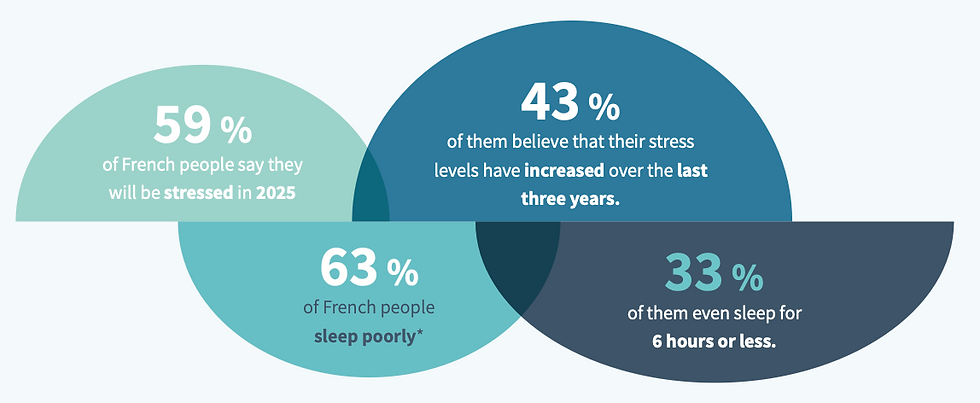White-papers collection dedicated to optimal-ageing: #3 Stress and sleep
- Sep 25, 2025
- 2 min read

Discover our white-paper dedicated to stress and sleep!
Mental health is defined by the WHO as a state of well-being that enables everyone to cope with the daily challenges of life, to flourish and to contribute to society. Long considered a taboo subject, it is now recognised as a major public health issue, affecting all age groups and social backgrounds.
In France, one in two people report having suffered from mental health issues in the last 12 months [1], with young adults and women appearing to be the most vulnerable. Globally, one in eight people already had a mental health disorder in 2019 - a figure that has risen sharply since the pandemic.
There are many factors that influence our mental health, including stress, sleep, diet, family environment and working conditions. Taking action on these factors is essential to preserve our emotional balance. Adopting a healthy lifestyle, maintaining good social relationships and reacting quickly to unexplained changes in behaviour are all effective preventive measures.
Stress and lack of sleep: accelerators of ageing... but reversible!
Two people of the same biological age can age differently depending on their lifestyle and exposure to stress. Studies show that certain intense situations (illness, surgery, pregnancy, long COVID, etc.) accelerate biological ageing – but the good news is that, this effect is partially reversible once the stress has gone.
Chronic stress, on the other hand, is a real danger. It acts as a silent accelerator of ageing.
The same is true for sleep: according to a Swiss study [2], 24 hours of sleep deprivation could age the brain by 1 to 2 years. But here again, the phenomenon is reversible after one or more nights of restorative sleep. Improving sleep quality has been shown to have positive effects on mental health (reduction in anxiety and depression), physical health (less chronic pain) and overall quality of life.

References :
1- IFOP, 2024
2- Chu et al, 2023


































































